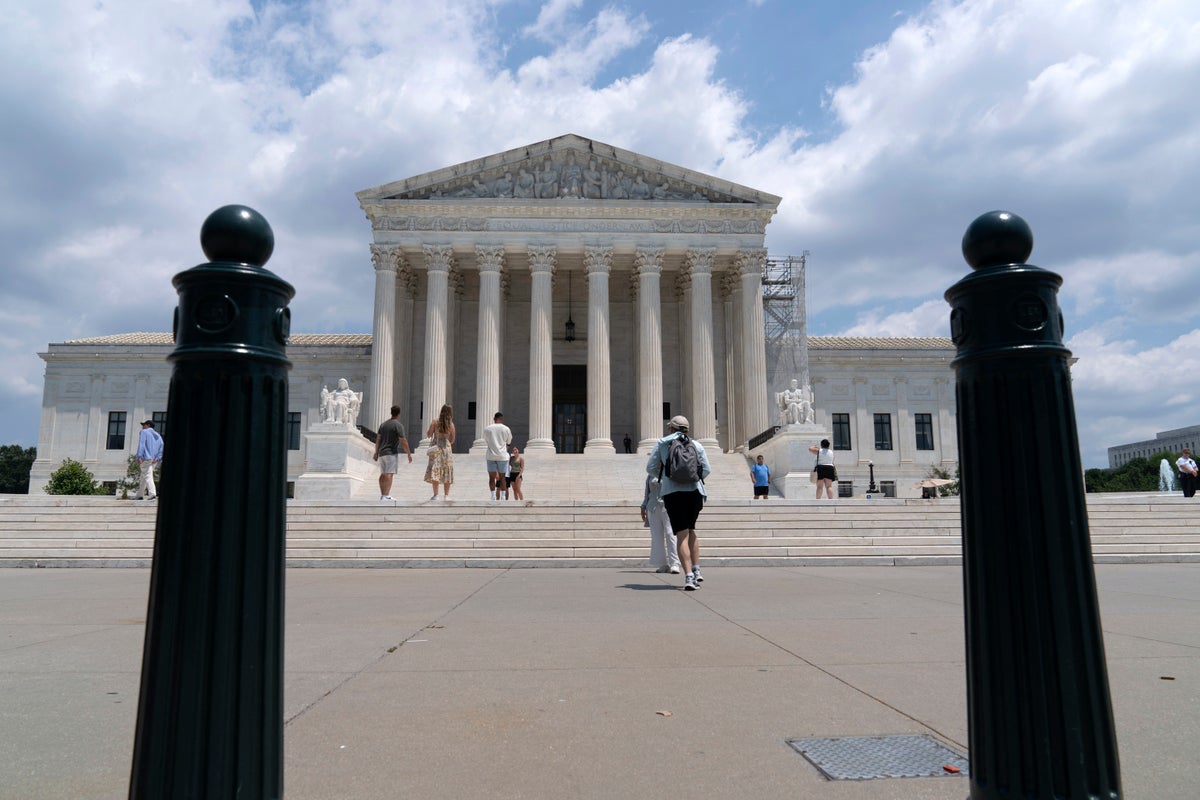
More than 330 Jan. 6 rioters could have their convictions and sentences tossed thanks to a ruling from the Supreme Court on Friday.
In a 6-3 decision, the court ruled that an “obstruction of an official proceeding” charge brought against Joseph Fischer, a former police officer and rioter, was too broadly used and the government will need to prove that a defendant “impaired the availability or integrity for use in an official proceeding of records, documents, objects, or other things used in an official proceeding, or attempted to do so.”
Chief Justice John Roberts, who delivered the majority opinion, used the example of eating lunch at the zoo to explain the ruling.
“To see why, consider a straightforward example. A zoo might post a sign that reads, ‘do not pet, feed, yell or throw objects at the animals, or otherwise disturb them.’ If a visitor eats lunch in front of a hungry gorilla, or talks to a friend near its enclosure, has he obeyed the regulation?
“Surely yes. Although the smell of human food or the sound of voices might well disturb gorillas, the specific examples of impermissible conduct all involve direct interaction with and harassment of the zoo animals. Merely eating or talking is so unlike the examples that the zoo provided that it would be implausible to assume those activities were prohibited, even if literally covered by the language,” he wrote.
The ruling could have massive impacts on Jan. 6 defendants such as Fischer, who were convicted of storming the Capitol and destroying property to try and disrupt the certification of the 2020 election.
However, the ruling appears to have little impact on the pending charges against former President Donald Trump, who is also accused of obstruction in some of his cases.
Justices Clarence Thomas, Samuel Alito, Neil Gorsuch, Brett Kavanaugh and Ketanji Brown Jackson concurred.
Justice Amy Coney Barrett, joined by Justices Sonia Sotomayor and Elena Kagan, dissented, believing the court’s interpretation was too narrow.
“The Court does not dispute that Congress’s joint session qualifies as an “official proceeding”; that rioters delayed the proceeding; or even that Fischer’s alleged conduct (which includes trespassing and a physical confrontation with law enforcement) was part of a successful effort to forcibly halt the certification of the election results,” Justice Barrett wrote.
She added: “Given these premises, the case that Fischer can be tried for “obstructing, influencing, or impeding an official proceeding” seems open and shut. So why does the Court hold otherwise? Because it simply cannot believe that Congress meant what it said.”
The case stems from Fischer who, like thousands of other rioters that day, attended the “Stop the Steal” rally in support of Trump. Fischer was arrested and charged with several crimes, including obstruction of an official proceeding.
Federal prosecutors invoked a law that is usually reserved in white-collar crimes, as they relate to witness, victim or informant tampering. It is a provision of the Sarbanes-Oxley Act, which was passed after the 2001 collapse of the Enron corporation, one of the largest financial fraud cases in US history. The law protects investors and holds corporations accountable.
The statute in question contains two parts. The first prohibits “corruptly” tampering with evidence that could be used in an official proceeding. The second prohibits a person from “otherwise” obstructing, influencing or impeding on an official proceeding.
Fischer pushed back against the charge, claiming it was unfairly used to prosecute him. His lawyer, Jeffrey Green, argued the obstruction of justice charge hinged on the word “otherwise” during oral arguments in April. He said his client could not be charged with violating the second part of the statute without violating the first part too.
Justices appeared divided over the matter during arguments. Kavanaugh voiced concern that the government used the statute to increase the sentencing of Jan. 6 rioters because the charge carries a maximum sentencing of 20 years.
Jackson suggested the court return the decision to a lower court to determine if the statute could be applied to Fischer under a more specific interpretation - something she echoed in her concurring opinion.
“And it might well be that Fischer’s conduct, as alleged here, involved the impairment (or the attempted impairment) of the availability or integrity of things used during the January 6 proceeding “in ways other than those specified in [the obstruction charge],” Jackson wrote.
During arguments, the government said Fischer intended to obstruct Congress’ certification of the election.
Prosecutors say in the days leading up to Jan. 6, Fischer texted his boss insinuating that there could be violence on that day, he could be arrested and his chief might need to post his bond.
He texted another person: “Can’t vote if they can’t breathe... lol” an apparent reference to the lawmakers in the Capitol.
On Jan. 6, the government says Fischer took a cell phone video of himself running through the crowd and yelling, “Charge!” before rushing into the building. Once inside, Fischer allegedly ran toward the police line and knocked over an officer.
Friday’s decision will likely have some, but small, impact on Trump’s federal election interference case since special counsel Jack Smith charged the former president with obstructing an official proceeding.
Smith previously said that Trump’s alleged attempt to install fake electors still violated the first part of the statute so the court’s ruling may not change that charge. Regardless, the government could bring new evidence to satisfy the new standard or drop the charge – but it would not absolve him of other charges.







